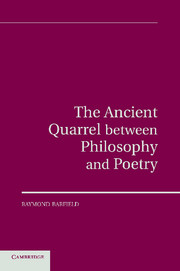Book contents
- Frontmatter
- Contents
- Acknowledgments
- Introduction
- 1 Socrates, Plato, and the Invention of the Ancient Quarrel
- 2 Aristotle, Poetry, and Ethics
- 3 Plotinus, Augustine, and Strange Sweetness
- 4 Boethius, Dionysius, and the Forms
- 5 Thomas and Some Thomists
- 6 Vico's New Science
- 7 Kant and His Students on the Genius of Nature
- 8 Hegel and the Owl of Minerva
- 9 Kierkegaard: A Poet, Alas
- 10 Dilthey: Poetry and the Escape from Metaphysics
- 11 Nietzsche, Heidegger, and the Saving Power of Poetry
- 12 Mikhail Bakhtin and Novelistic Consciousness
- Index
- References
2 - Aristotle, Poetry, and Ethics
Published online by Cambridge University Press: 03 May 2011
- Frontmatter
- Contents
- Acknowledgments
- Introduction
- 1 Socrates, Plato, and the Invention of the Ancient Quarrel
- 2 Aristotle, Poetry, and Ethics
- 3 Plotinus, Augustine, and Strange Sweetness
- 4 Boethius, Dionysius, and the Forms
- 5 Thomas and Some Thomists
- 6 Vico's New Science
- 7 Kant and His Students on the Genius of Nature
- 8 Hegel and the Owl of Minerva
- 9 Kierkegaard: A Poet, Alas
- 10 Dilthey: Poetry and the Escape from Metaphysics
- 11 Nietzsche, Heidegger, and the Saving Power of Poetry
- 12 Mikhail Bakhtin and Novelistic Consciousness
- Index
- References
Summary
When we step into the lecture hall with Aristotle, we quickly sense that we are in a different arena. There are a few echoes of Plato's judgment on poetry, as when Aristotle, discussing the education of children in the Politics, says, “The legislator should not allow youth to be spectators of iambi or of comedy until they are of an age to sit at public tables and to drink strong wine; by that time education will have armed them against the evil influences of such representations.” But Aristotle embraces the whole range of poetry as valuable in the right setting, and he spends most of his effort trying to understand the elements of great poetry in order to teach the poets.
Plato found a fair amount of overlap between poetry and metaphysics, motivating the quarrel as philosophy made its foray into domains dominated by the theological poets – the realm of truth, the good, the gods, being and access to the mysteries of the universe and the heavens. In all of this, poetry and philosophy occupied similar territory. In order for philosophy to do its work, the quarrel had to become trenchant indeed, Plato's three-part strategy being, as we have seen, to exile the poets; to create a new poetry that is capable of serving philosophy; and to tuck the real philosophy into the realm of silence, inaccessible to the best tools of the poet's trade.
- Type
- Chapter
- Information
- The Ancient Quarrel Between Philosophy and Poetry , pp. 32 - 51Publisher: Cambridge University PressPrint publication year: 2011



